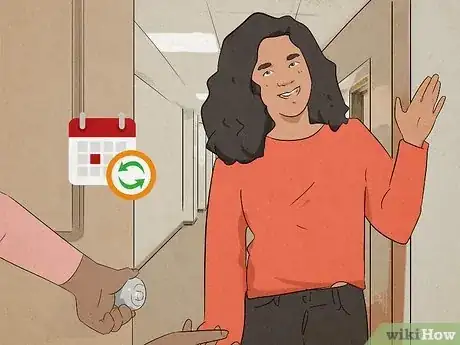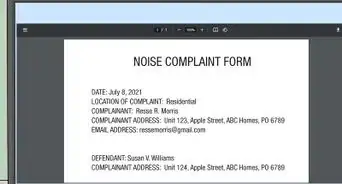This article was co-authored by Ebony Eubanks, MSW, ACSW, CAMS-II. Ebony Eubanks is a Therapist, and Founder and CEO of Peaceful Living Counseling and Professional Services of Philadelphia, PA and in Hockessin, DE. With over a decade of experience providing counseling and coaching to individuals, couples, and groups, she specializes in depression, anxiety, couples work, life guidance coaching, and anger management. Ebony holds a Master’s in Social Work from Temple University and is a member of the Academy of Certified Social Workers. She is a Certified Anger Management Specialist-II, Level II trained Gottman Couples Therapist. and Certified Gestalt Therapist. Ebony also holds additional certifications in Advanced Clinician Training.
There are 9 references cited in this article, which can be found at the bottom of the page.
This article has been viewed 94,615 times.
Dealing with an overly friendly neighbor can be annoying and awkward. You might feel the urge to spare their feelings and put up with it, but there are steps you can take to address the issue. With any luck, they’ll take the hint when you repeatedly avoid them or find ways to politely end conversations. If they don’t, you should confront them sooner rather than later. Be firm, calm, and clear, and explain to them the sort of neighborly relationship you’d like to have.
Steps
Setting Boundaries with Your Neighbor
-
1Resist the urge to avoid them. While it may seem easiest just to avoid your neighbor — say by peeking out your window to make sure they aren't around when you leave the house or by pretending you're not home when they knock — this is simply prolonging the issue and may, in fact, cause their behavior to escalate. Instead of avoiding your neighbor, you can set boundaries in a very non-confrontational way.
-
2Look outside before exiting. The easiest way to avoid your overly friendly neighbor is to look outside before walking out the door. Peer through your peephole or window and, if you see them, wait a few minutes before opening the door. If you exit your apartment and hear them around the corner, avoid an awkward encounter by waiting for them to leave the building or enter their apartment.[1]Advertisement
-
3Tell them you’re in a rush and can’t chat. You might not have time in your schedule to wait for them to leave the scene, or they might see you head out and bombard you. Stop a long-winded conversation before it starts. Smile, wave or say hello, and keep walking.
- Say something like, “Hi there! I’m in a rush and can’t chat. Catch up with you later!”
- With any luck, they’ll take the hint after you do this a couple of times.
-
4Excuse yourself politely to exit conversations. A friendly, neighborly conversation starts to get stale after about four minutes.[2] If they start to gab and you’ve reached your limit, find a way to gracefully end the conversation.[3]
- Try saying, “Well, I’m running late for an appointment. Have a good one!” Other excuses could be a lunch or dinner date, work, or meeting your workout partner.
- If you’re entering your home, you could say, “I have to start dinner,” or “I have piles of laundry (or another chore) to do.” You could always just leave it vague and say, “I just noticed the time - I have to run!”
-
5Reschedule chats to a more convenient time. If your neighbor is at your door, you are not required to answer, especially if you don't feel safe doing so. If, however, you feel comfortable answering the door, you can quickly set a boundary by saying, "Now is really not a great time for me to talk." If you wish to have a relationship with your neighbor, suggest an alternate time that you can talk. Say, "Are you free tomorrow afternoon, around four? I'll be free then and would love to take a walk and catch up."
- If you don't like them dropping by unannounced, you can also tell them politely, “It’s really best to call or set something up instead of popping in.”
Confronting Your Neighbor
-
1Consider how long you’ll be neighbors. If you’re a renter or selling your home, and you know you’ll be leaving the neighborhood soon, you might just want to set boundaries (for instance by telling your neighbor "Sorry, I don't have time to chat!") and not actually get into a discussion about their behavior. Matters are a bit more complicated if you and your neighbor are both homeowners or long-term renters. You should confront them about your discomfort instead of trying to spare their feelings or let tensions mount.[4]
-
2Confront them sooner rather than later. If you’ve politely given hints or tried to avoid them with no luck, you might have to have a face-to-face conversation with them. You should make your feelings clear as soon as you notice an issue developing. Delaying a calm, firm conversation will only encourage their intrusive behavior.[5]
- You might feel the urge to just be nice and spare their feelings, but letting tensions mount could result in a bigger issue in the future. Further, if you lead them to believe their behavior is fine, you’ll end up hurting their feelings more when you finally make your feelings known.
-
3Be firm and honest about how they make you feel. You should be clear and honest with your neighbors about any issues. Be respectful and polite, but try not to sugarcoat your point too much.[6]
- Try saying, “You are a warm, nice person. I know you’re being friendly, and I hope you don’t find me rude, but I’m just not very social.”
- If you’d like, you could add something like, “My schedule is just so tight right now, and I have so many responsibilities to juggle. I find our chats pleasant, but they always seem to make me run late!”
-
4Act as a united front if you’re married or have a roommate. If you live with a spouse or roommate, talk to them about how to handle your overly friendly neighbor. Come up with a strategy and make sure you both follow through with it.[7]
- In any case, make sure you and your spouse or roommate are a united front. Sending mixed signals will only aggravate the situation. For example, if your neighbor follows you to your door and tries to come in, you could say, “My roommate and I have a 'call ahead' policy — we really don't like people dropping by.”
-
5Explain the kind of neighborly relationship you desire. Try explaining to them that, in your experience, good fences make good neighbors. Tell them that you’d like to have an amicable relationship and look out for each other’s property, but aren’t comfortable with anything more.[8]
- Try saying, “I’ve become close with neighbors in the past, but ended up having a terrible disagreement that’s made me wary of getting too close to my neighbors. I hope you aren’t insulted, and I mean no offense, but I think it’s best to keep some boundaries.”
-
6Confront your neighbor who gossips. You might like that your friendly neighborhood gossip lets you know about fascinating local news. However, keep your conversations brief, and stick to inoffensive topics. You should ask them not to talk badly about your other neighbors if they start to make things too personal.[9]
- If they start putting someone down, try changing the subject or find an excuse to leave. If they ask you about your business or for your opinion on someone else, just let them know you’re not friendly enough with them to share your or anyone else’s secrets. Calmly say, “I really don’t like talking badly about other people, especially neighbors.”
-
7Stop your neighbor from bringing over food. It’s nice when a neighbor bakes you a pie every now and then, but an overly friendly neighbor might try to make it a daily or weekly ritual. They might also try to make you feel obligated to return the favor. If it becomes a problem, express your gratitude, but make it clear you want them to stop.[10]
- Suppose your neighbor starts bringing over food every few days, and you’re tired of it. Tell them, “You know, I really have to start making my own food! I just can’t accept any more of yours.”
- You could try to be polite and say, “I don’t want to put you out or burden you.” If they persist, respond by saying, “I really hate to say it, but it’ll probably just go to waste. I really appreciate it, but we don’t eat many sweets (or whichever items they prepare).”
- You could also try suggesting a local charity, like a religious organization or soup kitchen, that would welcome their baking or cooking skills.
Handling Extreme Situations
-
1Deal with a neighbor who doesn’t respect your space. In more extreme cases, an overly friendly neighbor might insist on touching you or otherwise intruding your personal space. Even if they believe touching your shoulder when they greet you is harmless, you should tell them to stop if it makes you uncomfortable.[11]
- Look them in the eye, stand up straight, and do your best to project confidence. Calmly and assertively say, “I don’t feel comfortable with being touched like that.”
- There’s no need to make excuses for them or apologize, but you can gauge your response based on your level of discomfort. If your neighbor touches your shoulder, and it’s annoying but you don’t find it threatening, politely tell them to stop. If they touch you in way you feel is inappropriate, tell them their action is harassment, and don’t hesitate to notify authorities if they persist.
-
2Contact authorities if you feel unsafe. In rare cases, an overly friendly neighbor might be unstable or threaten your safety. You should get help if they respond in a threatening way to the hints you've dropped or conversations you've had about your space.[12]
- First, contact your property manager or homeowner's association. They can help mediate the situation before it escalates. If you believe you're in immediate danger, call the police or emergency services.
-
3Ask your property manager about relocating. If you live in an apartment complex or building, relocating to another floor or section of the complex might be an option worth exploring. That way, you'll avoid daily interactions with your intrusive neighbor without having to go through the burden of moving to another complex.[13]
- Describe your situation to your property manager. Ask them, "Are there any available apartments on another floor or in a building on the other side of the complex?"
- Be sure to ask them to waive security deposits and other fees, since you're an existing resident relocating due to an issue that's out of your control.
References
- ↑ https://www.apartmenttherapy.com/do-you-avoid-your-neighbors-202436
- ↑ http://www.telegraph.co.uk/finance/property/9379160/Why-the-best-neighbours-are-the-ones-that-keep-their-distance.html
- ↑ https://hbr.org/2010/03/exiting-a-conversation-gracefu-2
- ↑ http://www.nolo.com/legal-encyclopedia/scared-your-neighbor.html
- ↑ http://www.marketwatch.com/story/when-friendly-neighbors-get-too-friendly-2015-05-15
- ↑ http://www.cityofvancouver.us/cmo/page/tips-prevent-conflict-neighbors
- ↑ http://articles.chicagotribune.com/2004-07-14/features/0407140068_1_biological-mother-neighbor-visiting
- ↑ http://www.telegraph.co.uk/finance/property/9379160/Why-the-best-neighbours-are-the-ones-that-keep-their-distance.html
- ↑ http://www.goodhousekeeping.com/life/advice/a16625/handle-rude-neighbor-may05/
About This Article
Overly-friendly neighbors can be frustrating, but you can establish some healthy boundaries with them to keep yourself sane. When you see your neighbor, just say something like, "Hi there! I'm in a rush and can't chat. Talk to you later!" Do this a few times and eventually your neighbor should get the hint that you prefer to keep to yourself. If you do get caught in a conversation with them, end the conversation politely by saying something like, "I have to get started on dinner now," or "I've got to get back to doing laundry, talk to you later!" The more you distance yourself from your neighbor and avoid talking to them, the more likely they are to start leaving you alone. For more tips from our co-author, like how to confront your neighbor if they take things too far, keep reading.








































































